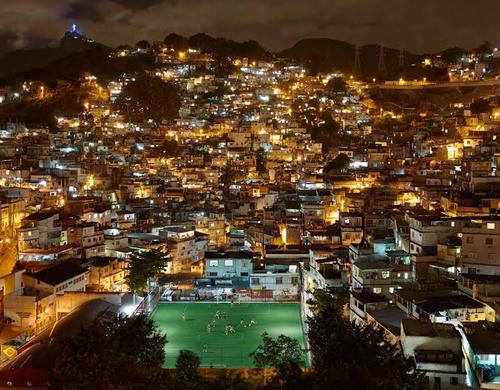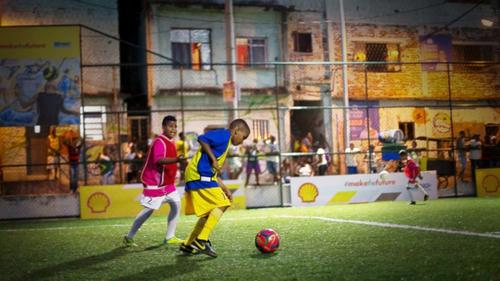Soccer Field Powers Brazilian Slum
December 8, 2014

A favela (Brazilian slum) in Rio de Janeiro now has a soccer field that harvests energy through the steps of kids playing on it, providing energy to the surrounding neighborhood.
In its largest installation to date Pavegen — a UK-based startup that has developed floor tiles that harvest energy from footsteps — teamed with gas and energy company Shell to install 200 tiles into a soccer pitch that Shell redeveloped in Morro da Mineira, a favela in Rio de Janeiro.
Click through to see a gallery of images from the Morro da Mineira project:

The installation is aimed not only at promoting the use of alternative energy to communities that need it in ways that also support local interests, but also at potentially recruiting bright young Brazilians into engineering careers. The project was completed in three days by a five-person team and the field opened on Sept. 11.
“We wanted to contribute to the football legacy in Brazil while educating innovators of the future on a sustainable alternative to fossil fuels,” Sanaa Siddiqui, communications officer at Pavegen, said. “This installation could inspire the younger residents to pursue a STEM career, as well as helping to provide renewable electricity to a much deprived area of the world. The people-powered football [soccer] pitch ensured the favela gained renewable electricity through safer, more reliable means, uniting the community through sport as a result.”
Since its inception in 2010, Pavegen has been developing floor tiles, 95% of which are made from recycled tires, that store the power from each footstep that passes over them. They do this by flexing 5mm when stepped on, and converting that downward movement into electricity in constant pulses of power — one to five seconds per footstep, depending on the weight of the person. The tiles generate 12V DC of electricity, and up to 8W of kinetic energy can be converted over the duration of each footstep.
Pavegen has been working quickly to demonstrate its technology, and already has a number of big-name projects under its belt. These include providing energy for the lighting of the West Ham tube station in London through tiles installed there during the 2012 Olympics, and an installation in Terminal 3 of London’s Heathrow Airport that also powers local lighting there.
The tiles in the Morro da Mineira soccer field are primarily providing energy for floodlights at the field, in tandem with solar panels installed there as well, Siddiqui said.
“The Pavegen tiles work … with solar panels to store energy in a generator, which powers the lights surrounding the pitch in the evening,” she said. “If one step generates up to 8 watts, then Pavegen can generate 2.2 million watts through a 90-minute duration of a game.” She added that, on a fully charged battery, the tiles and solar panels can together power the pitch and surrounding favela for up to 10 hours. But this is entirely dependent on the amount of times the pitch is used, as well as a number of other factors, such as weather, number of players, footsteps per tile, etc.
The company hopes to participate in more projects like this that not only help communities that can benefit from alternative energy sources but also allow Pavegen technology to work optimally doing what it’s been designed to do, Siddiqui said.
“Pavegen works best at scale; if one person steps on our tile, they can power a lightbulb for a few seconds,” she said. “Imagine that power, amplified by millions of footsteps on millions of our tiles. The energy generated could form an integral part of our urban infrastructures in the future.”
Related posts:
About the Author(s)
You May Also Like



